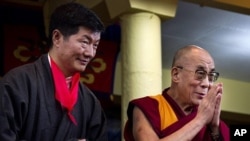Tibetan exiles say this week's inauguration of a secular political leader to take over administrative duties from the Dalai Lama will help produce a livelier democracy and advance the long term goal of returning to their homeland.
Traditional cultural dancers performed Tuesday for newly inaugurated Tibetan Prime Minister-in-exile Lobsang Sangay and invited guests, including parliamentarians from around the world. Mr. Lobsang told the guests his administration would set a new example for democracy, with politics deeply influenced by Buddhist morality and civility.
The new Tibetan leader is replacing a revered Buddhist monk in the leadership role. Lobsang is the first Tibetan prime minister to take office since Tibetan spiritual leader, the Dalai Lama, removed himself from political duties.
Chime Youngdung, President of the Tibetan exile National Democratic Party, says the shift toward secular rule is significant.
"Up to now, Tibetan politics and the dharma [the Buddhist concept of individual conduct in conformity with the principle or law that orders the universe] are mixed. Now, the dharma and politics should go separate," Youngdung said.
Tenzin Tsundue, a well-known Tibetan independence activist, says Mr. Lobsang's communication skills and charisma energize Tibetan exiles.
"Among the Tibetan community, he's a star. When he comes on stage, everybody claps. No Tibetan leader up until today has been whistled at. He's somebody who attracts that kind of genuine public expression of excitement," Tenzin Tsundue said.
The Dalai Lama has been the political and spiritual leader of exiled Tibetans since he established the Central Tibetan Administration here in northern India more than 50 years ago. Tibetan exiles describe it as the legitimate government of their Chinese-occupied homeland, and the main platform for seeking autonomy.
Tenzin Choekyi, general secretary of the pro-independence Tibetan Youth Congress, says reverence for the man Tibetans call "His Holiness" made criticism of him and his religious subordinates almost impossible. A lay person like Mr. Lobsang, she says, is a much easier target for public debate.
"We come from a Buddhist culture and every time we see a monk we tend to show more reverence to a monk. But it will be easier to sort criticize him [Lobsang], openly or closed door also. Because he has that sort of accessibility to him," said Tenzin Choekyi.
Lobsang Wangyal, director of the "Miss Tibet" pageant held recently in Dharamsala, says criticism will be healthy for the Tibetan exile leader.
"That makes him great, that makes him good, that makes him able. That makes him think, that makes him move. So these are very important elements to develop our society, to move forward like this," Wangyal said.
Mr. Lobsang has promised to invest in education to produce at least 10,000 highly skilled Tibetan professionals like himself to advance exile democracy. Tibetan exiles also say they will also gradually move to a system of multi-party democracy.
The establishment of democratic institutions is seen as a crucial step in fostering Tibetan exiles' ability to stand on their own after the 76-year-old Dalai Lama passes away.
Tibetan Exiles Say Secular Politics Will Produce Livelier Democracy
- By Kurt Achin




